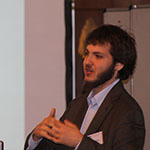Euroacademia Conferences
 Europe Inside-Out: Europe and Europeanness Exposed to Plural Observers (9th Edition) April 24 - 25, 2020
Europe Inside-Out: Europe and Europeanness Exposed to Plural Observers (9th Edition) April 24 - 25, 2020 Identities and Identifications: Politicized Uses of Collective Identities (9th Edition) June 12 - 13, 2020
Identities and Identifications: Politicized Uses of Collective Identities (9th Edition) June 12 - 13, 2020 8th Forum of Critical Studies: Asking Big Questions Again January 24 - 25, 2020
8th Forum of Critical Studies: Asking Big Questions Again January 24 - 25, 2020 Re-Inventing Eastern Europe (7th Edition) December 13 - 14, 2019
Re-Inventing Eastern Europe (7th Edition) December 13 - 14, 2019 The European Union and the Politicization of Europe (8th Edition) October 25 - 26, 2019
The European Union and the Politicization of Europe (8th Edition) October 25 - 26, 2019 Identities and Identifications: Politicized Uses of Collective Identities (8th Edition) June 28 - 29, 2019
Identities and Identifications: Politicized Uses of Collective Identities (8th Edition) June 28 - 29, 2019 The European Union and the Politicization of Europe (7th Edition) January 25 - 26, 2019
The European Union and the Politicization of Europe (7th Edition) January 25 - 26, 2019 7th Forum of Critical Studies: Asking Big Questions Again November 23 - 24, 2018
7th Forum of Critical Studies: Asking Big Questions Again November 23 - 24, 2018 Europe Inside-Out: Europe and Europeanness Exposed to Plural Observers (8th Edition) September 28 - 30, 2018
Europe Inside-Out: Europe and Europeanness Exposed to Plural Observers (8th Edition) September 28 - 30, 2018 Identities and Identifications: Politicized Uses of Collective Identities (7th Edition) June 14 - 15, 2018
Identities and Identifications: Politicized Uses of Collective Identities (7th Edition) June 14 - 15, 2018
The Political Language of Moral Panics: Teutophobia and the Image of a Besieged Romania in 1871
-
-

-
Presentation speakers
- Andrei Dan Sorescu, Faculty of Political Science, Bucharest University, Romania
- Download presentation
Abstract:
The paper seeks to examine the political vocabulary employed by anti-conservative Romanian journalists who, in the wake of the Prussian victory of 1871, attempted to forge – through fear and suspicion – a greater sense of solidarity among their readers, playing sympathy and loathing toward Western cultural influences against each other, imagining and constructing ‘the nation’ as a moral community. Teutophobic rhetoric – often-times rooted in earlier anti-dynastic tirades against the country’s German prince – was shared by writers regardless of sympathies towards either the French Empire or Republic. An unbroken sequence of moral panics – though abortive if judged by their effects at large – created a focus on anxieties regarding the ‘effectiveness’ of both physical borders and ideological limits of ‘the nation’, using concepts themselves lifted wholesale from French political discourse. Methodologically, our work strives to outline a history of political keywords transformed in a Romanian context – perspectives complementary to their Western meanings, from ‘tyranny’ to ‘constitutionality’, crucial in defining the citizen caught in the crossfire of perceived historical transformation. Nevertheless, defining an enemy within the in-group broadly construed as ‘the nation’ is, as shall be argued, not synonymous with singling out the local German community as such, but related to the negative role ascribed by the opposition to the conservative government, seen as the agent of imperial Germany’s . The emphatic identitary frailty of a nation-building in a setting of yet-to-be-achieved independence shall be analyzed through episodes such as the violent reaction against ‘the Danube as a German river’ or the anti-constitutional project of a group of conservative noblemen to colonize Germans in ‘model villages’. As such, the paper would provide a novel insight into the way in which a modernizing Eastern polity ‘peopled’ itself against the backdrop of a westward-looking siege mentality.
-
Related Presentations


















